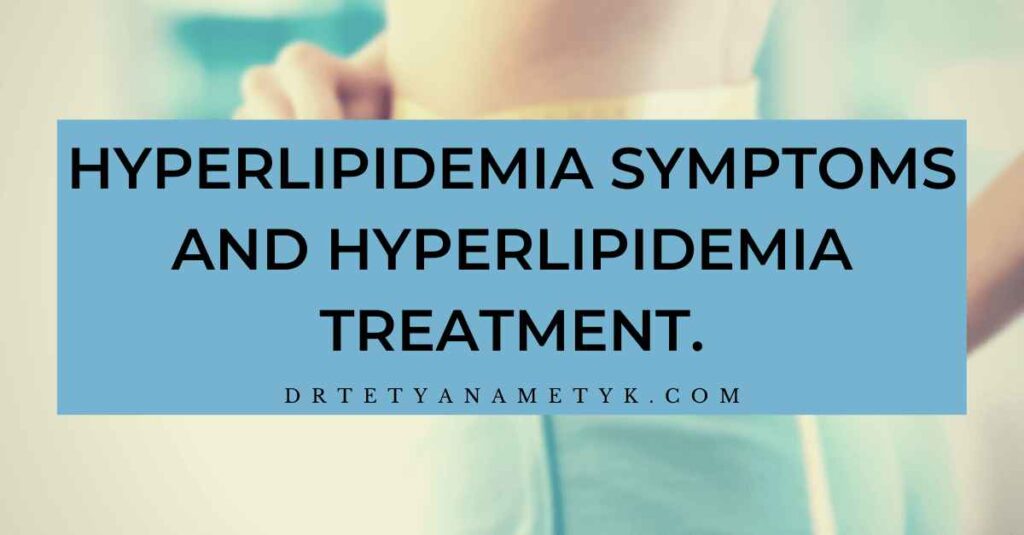Hyperlipidemia is the condition when the blood contains a large quantity or amount of fats, lipids, and triglycerides, resulting from the high consumption of fat or cholesterol-rich food or diet. One should be very cautious while eating about what is healthier for a person and what can be alarming for a person’s health. As the name suggests, hyperlipidemia refers to terms hyper means high or large in quantity lipidemia means quantity or level of lipid, cholesterol, and triglycerides which causes or result in the accumulation of the lipids or other kind of components in the form of a plaque in the blood vessels, most commonly in the arteries leading to severe damage to the arteries and blocking the way of blood which is pumped to organs or to the heart, which itself is essential for the proper functioning of the heart. On the other way, the increasing or elevated amount of cholesterol in the blood causes hyperlipidemia symptoms.
Cholesterol fats are important for several purposes, such as metabolic processes, but excess of anything is bad. So, when cholesterol or lipid level exceeds the normal limit, your body adopts different changes. For example, a person becomes overweight as the body gains an abnormal number or amount of bad cholesterol (LDL) or fats.
Hyperlipidemia, a genetic disease:
Factors contributing to hyperlipidemia include a high quantity of the fats or lipid-rich diet and also the dull or desk-bound routine or lifestyle. It can be the result of genetic changes occurring in a person’s genome. There is another kind of hyperlipidemia that is referred to as a mixed kind of hyperlipidemia.
There is an elevated amount of cholesterol or lipids in the blood. As a result of this excessive amount of bad cholesterol, a person’s weight increases, and the person’s body becomes obese. When they are not exercising or actively doing something, this is riskier. A person has diabetes, and if a person is obese, the risk factors of developing hyperlipidemia increase.
Hyperlipidemia symptoms and signs:
Hyperlipidemia symptoms are not easily noticeable, but there are a few common signs that occur when a person has high cholesterol or lipid level. Chest pain, known as angina, and other symptoms related to coronary artery diseases occur at an early young age.
In adults, the common symptoms and condition are blockage of vessels such as arteries, which increases the pressure on the heart resulting in increased chest pain and leading to a heart attack at an early age. Among the most commonly occurring symptoms are fatty deposits in the skin known as xanthomas, which occur in several body parts in hands, elbows, knees, and ankles or also around the cornea(eye). Other symptoms are deposits of cholesterol in eyelids known as xanthelasmas.
Other symptoms are listed below:
- Deposits or sores on knees, toes, and hands.
- Chest pain is also known as angina, is the common hyperlipidemia symptom.
- A heart attack occurs due to arteries blockage because blood is not supplied correctly.
- Most frequently, cramping occurs in the body parts and results in muscle weakness.
- The person with hyperlipidemia faces trouble in speaking, and because of weakness, stroke and heart attacks are common.
- Damage caused by high-level hyperlipidemia results in stroke and heart attacks.
- When there is a high level of cholesterol and fats, its storage within the body leads to weight gain, body gain weight, and the person with hyperlipidemia becomes overweight.
- High and increased levels of bad cholesterol in the blood.
- Swelling of the hands and feet.
These hyperlipidemia symptoms commonly occur in the person suffering from a high and abnormal number of bad cholesterols.
After having much knowledge about symptoms and causes of hyperlipidemia, you have to find out how you can treat hyperlipidemia as it’s lethal. So, hyperlipidemia treatment includes changing the lifestyle which a person adopts. If your habit changes and lifestyle changes, then you can reduce the risk of hyperlipidemia to a lower level.
Hyperlipidemia symptoms treatment and diagnosis:
It would be best if you ate healthy to stay healthy and avoid fatty food that causes a high level of cholesterol, eat food that is healthier, omega-13 rich, and increase fiber intake to stay healthy.
And avoid bad cholesterol, try to adopt a lifestyle that makes you active mentally and physically as physical and mental health is vital if someone wants to live a healthier life. To avoid bad cholesterol, you should eat fiber-rich foods, increase protein and vitamin intake, and lower carbs and fats.
Suppose a person is lazy and is overweight. In that case, they should develop a habit of regularly exercising. It helps to reduce and lose weight as the fatty layer reduces.
Also, exercise is vital to make the body strong, and the muscle becomes powerful when you exercise daily and increases the blood flow. So, on a serious note, you have to avoid alcohol and smoking, eat healthy food, and develop the habit of exercise.
HMG-CoA reductase inhibitors are used for the therapy of most patients suffering from hyperlipidemia. These drugs are considered the most effective in treating hyperlipidemia, play a role in lowering the LDL bad cholesterol level in the body, and have effective lipid-lowering agents.
People with hyperlipidemia also take statins drugs to lower cholesterol levels. Hyperlipidemia is treatable, but you have to keep the check and balance that what are you eating and are you exercising as you are expected to do or not.
Along with a healthy diet such as fiber intake and exercising daily, you have to take the prescribed medicine as well. Dietary therapy is mostly suggested for patients who have a high LDL or cholesterol level in the blood.
The most beneficial alteration in the body takes place when you reduce the intake of the saturated and fat-rich diet. One should eat lots of fruits, vegetables, nuts, fish, and other foods rich in protein. It would help if you restrained from the following food as it increases the level of cholesterol in the body:
- Cheese.
- Egg yolk.
- Fried and oily food.
- Ice creams and pastries etc.
- Red meat.
- Avoid taking too much alcohol, restrain from drinking too much.
- Avoid spicy food and fat-rich food.
If you will follow the above guidelines and avoid eating food that elevates the level of cholesterol or fat in the blood, you will easily overcome hyperlipidemia. Use the oil which is healthier, such as canola and soyabean oil. Also, you can take drinks which are best in lowering cholesterol, such as:
- Green tea.
- Tomato juice.
- Oat drinks.
- Berry smoothies.
- Cocoa drinks.
- Plant milk smoothies.
- Drinks that contain sterols and stanols.
If you drink and eat, which helps lower cholesterol, you will quickly treat hyperlipidemia. Take the following vitamins to lower cholesterol:
- Niacin and niacinamide it is vitamin B.
- Psyllium supplements.
- Soluble fibers such as oats, beans, peas, apple, citrus fruits, carrots, barley, etc.
- Consume Soy protein.
PIB surgery stands for partial ileal bypass surgery in which the cholesterol level is reduced to the minimum level. It is a safe, effective, and long-lasting treatment for hyperlipidemia to reduce cholesterol levels and lipoprotein and lipids.
Conclusion:
So, the only way to reduce or treat hyperlipidemia is to eat and drink healthier and exercise as much as you can to reduce weight and follow the guideline given or prescribed by the physician to become healthy and to beat disorders such as hyperlipidemia.
The central topics of hyperlipidemia treatment and hyperlipidemia symptoms are listed here. So, we recommend that you should reduce fat in food or fats in whatever you eat. Eat fiber-rich food and visit the doctor to consult him regarding your disease and know how you can reduce or decrease cholesterol in the blood.
You can visit Dr. Tetyana Metyk’s clinic to get treatment for your Hyperlipidemia symptoms and more. You can visit our Website for more information. And You can Contact Us any time to get assistance from a professional healthcare doctor.


I didn’t know that.
Right on my man!
Right on my man!
I was just telling my friend about that.